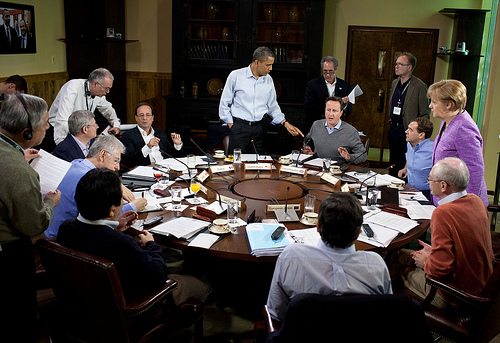G8 leaders gathered at Camp David over the weekend where President Obama announced the New Alliance for Food Security and Nutrition, striving to move 50 million people out of poverty by 2022. Organizations who work to reduce hunger and poverty commended U.S. leadership on food security, but some criticized other G8 nations for falling behind on their commitments to help the world’s poor.

Three years ago the leaders from France, Germany, Italy, Japan, the U.K., the U.S., Canada, and Russia gathered in L’Aquila, Italy. In a global recession, the world’s wealthiest nations promised to assist the world’s poorest countries, pledging $22 billion by 2012 to improve agriculture and food security. The U.S. is on track to meet its L’Aquila commitments by the deadline, but the G8 nations as a whole have given only 38 percent of their contributions, according to World Vision.
Adam Taylor, World Vision’s vice president for advocacy, said the G8 nations need to fulfill their promises and distribute the remaining funds.
“While we applaud the real progress that has been made on food security and nutrition, if we had to give the G8 a grade right now, it would be ‘incomplete’,” Taylor said in a statement.
Neil Watkins of ActionAid USA commended the U.S. for increasing its commitment to fight hunger, but he criticized other nations that have fallen behind on their commitments and have not promised to continue them into the future.
“Without a clear pledge to sustain L’Aquila public funding levels, this year’s G8 will be remembered as the summit that buried the L’Aquila pledge to fight hunger,” Watkins said.
Food security was not the top economic issues for the G8 nations that face their own recessions, a looming currency crisis, and austerity measures. With belt-tightening at home, G8 nations are less willing to provide aid to the world’s poor.
Oxfam’s Gregory Adams said the G8 nations are using the classic break up line, “It’s not you, it’s me,” as the reason for not fulfilling their commitments.
“Breaking up is never easy,” said Adams, “but the G8’s unwillingness to sustain their promises comes as the challenges facing poor people around the world are only getting harder.”
Obama also announced the New Alliance, a partnership between G8 nations, African countries, and private enterprise.
World Vision President Richard Stearns said that the New Alliance will be a success only if it helps children and others in need.
“Greater private investment is needed, but so is greater investment from developing country governments and donor countries. This investment is required in both agricultural development and basic health services for mothers and children if we are to ensure adequate nutrition for all children,” Stearns said.
The G8 nations represent about one-eighth of the world’s population, but their economies make up about half of the world’s wealth, according to the World Bank. According to World Vision, 18 million people in West Africa face hunger, and three million include children under five.








